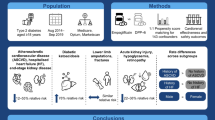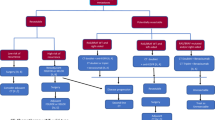Abstract
Background
The current analysis aims to provide an evaluation of the impact of diabetes mellitus (DM) on the efficacy and safety of first-line FOLFOX chemotherapy for patients with metastatic colorectal cancer (mCRC).
Methods
This is a pooled analysis of the comparator arms of two clinical trials (NCT00272051; NCT00305188) which evaluated first-line FOLFOX chemotherapy for patients with mCRC. The overall survival and progression-free survival according to patient subsets (non-diabetic and diabetic patients) were assessed through Kaplan–Meier analysis and log-rank testing. Propensity score matching was additionally conducted to account for heterogeneity in baseline characteristics of different subsets of patients.
Results
A total of 756 patients were enrolled in the current analysis; of which 64 patients have pre-existing DM while 692 patients were non-diabetic. Through Kaplan–Meier analysis, no evidence for overall or progression-free survival difference was found among the two patient subsets (P = 0.501; P = 0.960, respectively). Moreover, metformin treatment does not affect overall or progression-free survival among diabetic patients (P = 0.598; P = 0.748, respectively). Repetition of overall and progression-free survival assessment following propensity score matching does not reveal any differences. Comparing diabetic to non-diabetic patients, there were no differences between the two groups in terms of acute oxaliplatin-induced neurological symptoms including cold-induced dysthesia (P = 0.600), laryngeal dysthesia (P = 0.707), jaw pain (P = 0.743) or muscle pain (P = 0.506). Moreover, no difference was seen between the two groups in terms of the incidence of long-term oxaliplatin-induced paresthesia (P = 0.107), highest grade of paresthesia (P = 0.498) or rates of recovery from paresthesia (P = 0.268). Diabetic patients have, however, a shorter time to develop oxaliplatin-induced paresthesia (P = 0.024).
Conclusion
DM does not seem to affect overall or progression-free survival of mCRC patients treated with first-line FOLFOX chemotherapy. Moreover, DM does not influence the incidence or severity of oxaliplatin-induced paresthesia in those patients while it might lead to a shorter time to develop oxaliplatin-induced paresthesia compared to non-diabetic patients.



Similar content being viewed by others
References
globocan.iarc.fr. Last accessed on 27 Nov 2016.
Schmoll HJ, Van Cutsem E, Stein A, Valentini V, Glimelius B, Haustermans K, et al. ESMO Consensus guidelines for management of patients with colon and rectal cancer. a personalized approach to clinical decision making. Ann Oncol. 2012;23(10):2479–516.
van de Velde CJ, Aristei C, Boelens PG, Beets-Tan RG, Blomqvist L, Borras JM, et al. EURECCA colorectal: multidisciplinary mission statement on better care for patients with colon and rectal cancer in Europe. Eur J Cancer. 2013;49(13):2784–90.
Field KM, Kosmider S, Jefford M, Jennens R, Green M, Gibbs P. Chemotherapy treatments for metastatic colorectal cancer: is evidence-based medicine in practice? J Oncol Pract. 2008;4(6):271–6.
Oweira H, Giryes A, Mannhart M, Decker M, Abdel-Rahman O. Impact of time to start systemic therapy on the outcomes of patients with metastatic colorectal cancer treated with first-line FOLFOX chemotherapy: a patient-level pooled analysis of two clinical trials. Expert Rev Gastroenterol Hepatol. 2018. https://doi.org/10.1080/17474124.2018.1511426.
Wilde L, Roche M, Domingo-Vidal M, Tanson K, Philp N, Curry J, et al. Metabolic coupling and the reverse Warburg effect in cancer: implications for novel biomarker and anticancer agent development. Semin Oncol. 2017;44(3):198–203.
Giovannucci E, Harlan DM, Archer MC, Bergenstal RM, Gapstur SM, Habel LA, et al. Diabetes and cancer: a consensus report. Diabetes Care. 2010;33(7):1674–85.
Vona-Davis L, Rose DP. Adiposity and diabetes in breast and prostate cancer. In: Kolonin MG, editor. Adipose tissue and cancer. New York: Springer; 2013. p. 33–51.
Zanders MMJ, Vissers PAJ, Haak HR, van de Poll-Franse LV. Colorectal cancer, diabetes and survival: epidemiological insights. Diabetes Metab. 2014;40(2):120–7.
Paulus JK, Williams CD, Cossor FI, Kelley MJ, Martell RE. Metformin, diabetes, and survival among US veterans with colorectal cancer. Cancer Epidemiol Biomark Prev. 2016;25(10):1418–25.
https://www.projectdatasphere.org/projectdatasphere/html/home. Last accessed on 7 Oct 2017.
Yvette A, Gertraud M, SY B, RP H, Andrew G, SV W, et al. Type 2 diabetes and colorectal cancer survival: the multiethnic cohort. Int J Cancer. 2018;143(2):263–8.
Zhu B, Wu X, Wu B, Pei D, Zhang L, Wei L. The relationship between diabetes and colorectal cancer prognosis: a meta-analysis based on the cohort studies. PLoS One. 2017;12(4):e0176068.
Meng F, Song L, Wang W. Metformin improves overall survival of colorectal cancer patients with diabetes: a meta-analysis. J Diabetes Res. 2017;2017:8.
Engineer DR, Burney BO, Hayes TG, Garcia JM. Exposure to ACEI/ARB and β-blockers is associated with improved survival and decreased tumor progression and hospitalizations in patients with advanced colon cancer. Transl Oncol. 2013;6(5):539–45.
Voorneveld PW, Reimers, Bastiaannet E, Jacobs RJ, van Eijk R, Zanders MMJ. Statin use after diagnosis of colon cancer and patient survival. Gastroenterology. 2017;153(2):470–479.e4.
Ramanathan RK, Rothenberg ML, de Gramont A, Tournigand C, Goldberg RM, Gupta S, et al. Incidence and evolution of oxaliplatin-induced peripheral sensory neuropathy in diabetic patients with colorectal cancer: a pooled analysis of three phase III studies. Ann Oncol. 2010;21(4):754–8.
Funding
There is no funding for this study.
Author information
Authors and Affiliations
Corresponding author
Ethics declarations
Conflict of interest
No conflicts of interest.
Ethical approval
All procedures performed were in accordance with the ethical standards of the institutional and/or national research committee and with the 1964 Helsinki Declaration and its later amendments or comparable ethical standards.
Informed consent
Informed consent was obtained from all participants included in the study.
Rights and permissions
About this article
Cite this article
Abdel-Rahman, O. Impact of diabetes comorbidity on the efficacy and safety of FOLFOX first-line chemotherapy among patients with metastatic colorectal cancer: a pooled analysis of two phase-III studies. Clin Transl Oncol 21, 512–518 (2019). https://doi.org/10.1007/s12094-018-1939-8
Received:
Accepted:
Published:
Issue Date:
DOI: https://doi.org/10.1007/s12094-018-1939-8




